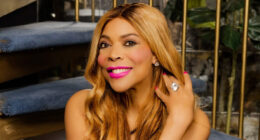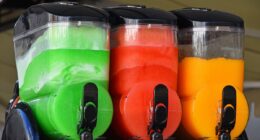On the day of my surgery in September 2020, my partner dropped me off at the clinic at 6 a.m.—they couldn’t stay with me because of pandemic precautions. But I felt calm because of what I was there to do. After conversations with my care team, including my surgeon and the assisting nurses, the anesthesiologists put me under in the surgery waiting room.
I briefly woke up right after, before the operation even started, and I was crying. Someone asked me, “Are you okay? Is everything okay?” I was trying to say “yes,” and they realized: “Oh—are these tears of joy?” I said, “Yes, yes, yes,” and then I went right back out.
A few hours later, the surgery was over. As I opened my eyes, I was instantly flooded with a sense of homecoming: My body had been returned to me. This is why taking chances and stepping toward your truth, even if it’s just taking an art class for the first time or hopping on that dirt bike you’ve always been too nervous to ride, is so important: You can’t ever know the enormous release and renewed connection to yourself that you’re capable of feeling when you embrace who you’re meant to be.
I spent a few weeks after surgery resting and watching Disney movies. My partner created a meal train—a system where friends and family members signed up to send food or visit. By letting people help me, I saw how cared for I am and how big of a community I actually have.
For that first month, I had to wear a tight binder to secure the affected areas so they could heal together, and drains that collected any excess fluid that might build up and result in complications. When I finally took my binder off, I was afraid that I wouldn’t look the way I wanted. But even as my body was recovering, I could tell that this was right, that it felt right, and that it looked exactly as it should.
READ RELATED: ‘Keep Him Emotional’: Jane Fonda Has Some Advice for People Raising Sons
Within six weeks of removing the binder, I was able to return to work—I have a recurring role as L.B. Brady on the TV series Good Trouble. I had reservations, given that I wasn’t able to raise my arms above my head yet. I called the costume designer and told her that I couldn’t put on T-shirts, so my character would need to wear button-ups. On my first day back, she pulled me aside and told me they had put zippers in the back of my shirts to make sure that getting dressed wouldn’t be difficult. I felt like she was helping me erase any final traces of fear of not being able to work after surgery.
Although Republican lawmakers who are banning gender-affirming health care for sport are pushing the false narrative that trans people regret receiving treatment, I’ve never felt regretful for a moment. Instead, I feel free. I play baseball, and when I swung a bat for the first time after my top surgery, it felt like I was flying. When I run to first base, I’m no longer confronted with a body that doesn’t feel right. I used to be terrified of swimming because I never wanted to be in a bathing suit around other people; at 40 years old, I recently went swimming with sea turtles for the first time. As I snorkeled, the resentment I felt about not being able to enjoy the water as a kid washed out into the ocean. I just felt grateful to be able to be there in that exact moment. To enjoy these revelations as they come.
Ultimately, taking testosterone and undergoing top surgery were the most loving, caring, accepting things that I could possibly do for myself. But this is not just about self-love: It is, for me, a connection to something that’s bigger than me. I feel deeply in touch with my own life and the world that surrounds me in a way that I didn’t feel before, and when you have that kind of profound relationship with existence, it changes everything. I feel like myself, the person I was created to be.
Related:





